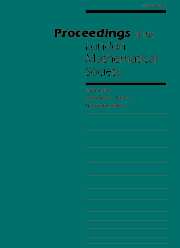Article contents
INVARIANT THEORY FOR UNIPOTENT GROUPS AND AN ALGORITHM FOR COMPUTING INVARIANTS
Published online by Cambridge University Press: 19 October 2000
Abstract
Let $X=\operatorname{Spec} B$ be an affine varietyover a field of arbitrary characteristic, and supposethat there exists an action of a unipotent group(possibly neither smooth nor connected). Thefundamental results are as follows. (1) An algorithm for computing invariants is given, by means of introducing a degree in the ring of functions of the variety, relative to the action.Therefore an algorithmic construction of the quotient, in a certain open set, is obtained. In the case of aGalois extension, $k\hookrightarrow B=K$, which iscyclic of degree $p=\text{ch} (k)$ (that is, such thattheunipotent group is $G={\Bbb Z}/p {\Bbb Z}$),an element of minimal degree becomes anArtin--Schreier radical, and the method for computing invariants gives, in particular, theexpression for any element of $K$ in terms of theseradicals, with an explicit formula. This replacesthe well-known formula of Lagrange (which is validonly when the degree of the extension and thecharacteristic are relatively prime) in the case of an extension of degree $p=\text{ch}(k)$. (2)In this paper we give an effectiveconstruction of a stable open subset where there is a quotient. In this sense we obtain an algebraic localcriterion for the existence of a quotient in aneighbourhood. It is proved (provided the variety isnormal) that, in the following cases, such an openset is the greatest one that admits a quotient:\begin{enumerate}\item[(a)] when the action is such that the orbits havedimension less than or equal to 1 (arbitrary characteristic) and, in particular, for any actionof the additive group $G_a$;\item[(b)] in characteristic 0, when the action is proper(obtained from the results of Fauntleroy) or the group is abelian. 1991 Mathematics Subject Classification:primary 14L30; secondary 14D25, 14D20.
Keywords
Information
- Type
- Research Article
- Information
- Proceedings of the London Mathematical Society , Volume 81 , Issue 2 , September 2000 , pp. 387 - 404
- Copyright
- © 1999 London Mathematical Society
- 7
- Cited by

